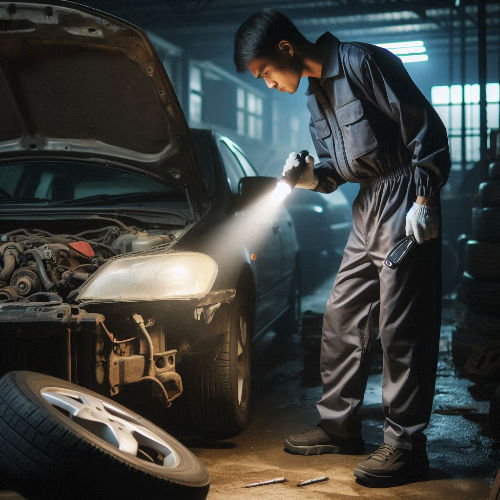Salvage car auctions present a unique opportunity for buyers looking to snag a vehicle at a fraction of the cost. These auctions feature cars deemed total losses by insurance companies but can still hold a string of potential benefits. Understanding how they operate and why people are drawn to them is essential.
At their core, salvage car auctions sell vehicles that have suffered damage but not beyond repair. Some cars end up here due to accidents, natural disasters, or theft recovery, making them an attractive option for those willing to invest in repairs. These auctions are perfect for mechanics, car enthusiasts, or anyone looking to restore a vehicle on a budget.
People often turn to salvage car auctions as a cost-effective way to obtain a vehicle. The lower initial price of these cars can significantly cut down the overall expense, even after factoring in repair costs. Moreover, some buyers find joy and satisfaction in bringing an old car back to life, making this a rewarding hobby.
However, diving into a salvage car auction without preparation can be risky. Knowing how these auctions function and what to expect will help you make more informed decisions. It’s crucial to understand the grading system used to categorize the level of damage and how to interpret it accurately.
The process typically begins with attending an auction, either online or in-person. You’ll need to register, provide necessary documentation, and place bids within your budget. The highest bid secures the car, and from there, post-purchase arrangements like transportation and repairs come into play.
Salvage car auctions can be a treasure trove of hidden gems if approached correctly. Whether you’re looking to save money, enjoy a hands-on project, or find rare parts, there’s something for everyone. Just make sure you’re well-informed and ready to take on the challenges that might come your way.
How to Evaluate a Salvage Car Before Bidding

When dealing with salvage cars, a thorough evaluation is your best friend. Jumping in blindly can lead to unforeseen expenses and headaches, so taking the time to inspect a potential purchase is critical.
Start by reviewing the vehicle history report. This provides vital details like the extent of damage, accident history, and previous ownership. Knowing what a car’s been through gives you a clearer picture of what lies ahead. Many auctions will provide this report for free, but if not, services like Carfax or AutoCheck are worth the investment.
Visual inspection comes next. Look over the exterior thoroughly for rust, dents, or uneven gaps that might indicate structural issues. Pay close attention to the alignment of panels and the condition of the paint. Inside, check for water damage, mold, or any signs of wear and tear that might need addressing.
Mechanical inspection is just as important. Bring a trusted mechanic with you if possible. They can check the engine, transmission, and suspension components. Keep an eye out for leaks, unusual noises, or anything that seems off. Don’t forget the tires and brakes – replacing these can add unexpected costs.
Estimating repair costs is a vital step. Once you understand the extent of damage, list out the parts and labor needed to get the car roadworthy again. Compare these costs against similar cars in good condition. This helps you gauge whether buying the salvage car is financially viable.
Factor in the availability of parts for repairs. Some models may have parts in abundance, making repairs straightforward, while rarer cars can present a challenge. Scour online forums, local salvage yards, and specialty shops to see what’s available and what it will cost you.
Lastly, don’t underestimate the value of a second opinion. Whether it’s from another mechanic, a knowledgeable friend, or an online community, getting different perspectives can highlight things you might have missed. This extra step can provide peace of mind before committing to a bid.
Top 5 Salvage Car Auctions and Their Reviews
For anyone interested in salvage cars, knowing where to start is key. Here’s a detailed review of the top five salvage car auction sites, breaking down the pros and cons of each.
1. Copart
Copart is one of the most well-known online salvage car auctions. They offer a vast inventory of vehicles, making it easy to find a match for your needs. The site provides detailed vehicle descriptions and history reports, which helps in making informed decisions.
Pros: Extensive inventory, user-friendly interface, detailed reports.
Cons: Membership fees, potential hidden fees during transactions.
2. Insurance Auto Auctions (IAA)
IAA stands out with its comprehensive online platform and robust customer support. They offer various auction formats, including traditional live auctions and online-only options, catering to different preferences.
Pros: Multiple auction formats, excellent customer support, accurate vehicle descriptions.
Cons: Some vehicles have limited inspection opportunities, local fees and regulations can vary.
3. AutoBidMaster
Affiliated with Copart, AutoBidMaster offers an easy entry point for first-timers. Their assistance with transportation and paperwork streamlines the buying process.
Pros: Beginner-friendly, transportation assistance, extensive resources for buyers.
Cons: Higher fees compared to other platforms, occasional delays in processing documents.
4. ACV Auctions
ACV Auctions focuses on transparency and a reliable inspection process. They provide detailed condition reports and allow live bidding, ensuring you get the best possible deal.
Pros: Reliable inspections, live bidding, transparent process.
Cons: Fewer listings compared to larger platforms, primarily dealer-focused.
5. SalvageBid
SalvageBid offers a straightforward, no-nonsense approach to buying salvage cars. They have a user-friendly website, and the bidding process is smooth and efficient.
Pros: Easy-to-navigate site, efficient bidding, good variety of vehicles.
Cons: Limited customer service, inspection details may not be as thorough.
Pros and Cons of Buying Salvage Cars
Salvage cars can be a great way to save money, especially if you’re handy with repairs or know a good mechanic. The biggest advantage is the lower purchase price. You can often buy a salvage car for a fraction of its market value, making it an attractive option for budget-conscious buyers.
In addition to cost savings, salvage cars can be a rewarding project. For car enthusiasts, rebuilding a damaged vehicle offers a sense of satisfaction and a personal touch. It also allows for customization, turning a wreck into a unique, personalized ride.
However, buying salvage cars isn’t without its risks. One significant drawback is the potential for hidden damage that isn’t immediately apparent. Even with thorough inspections, some issues might only surface once repairs are underway, leading to unexpected costs.
Another disadvantage is the difficulty in obtaining insurance and financing. Many insurers are hesitant to cover salvage vehicles, and those that do often charge higher premiums. Similarly, securing a loan for a salvage car can be challenging, as lenders view them as higher-risk investments.
Resale value is another consideration. Salvage cars generally have lower resale values compared to clean-title vehicles. If you plan to sell the car later, recovering your investment might be tough. Buyers are often wary of salvage cars due to their history, which can limit your market.
Dependability is also a concern. Salvage cars may have underlying issues that affect their reliability over time. Even if repairs seem thorough, the car’s long-term performance could be compromised, leading to more frequent repairs and maintenance.
Despite these challenges, salvage cars can be a viable option for those willing to take the risk. Thorough research, honest evaluations, and a clear understanding of what you’re getting into can help mitigate the downsides. Weigh the pros and cons carefully to decide if a salvage car aligns with your needs and capabilities.
Tips for Successful Bidding on Salvage Cars
Setting a budget is the first step in successful bidding. Determine the maximum amount you’re willing to spend, including repair costs and potential hidden fees. Sticking to this budget prevents overspending and ensures you don’t get caught in the heat of the moment.
Understanding the auction process is crucial. Whether it’s an online platform or an in-person event, familiarize yourself with the rules and procedures. Know how to register, place bids, and handle post-auction logistics to avoid any surprises.
Inspect the car as thoroughly as possible. While we discussed visual and mechanical inspections, don’t forget to read the auction listing carefully. Look for detailed photos, repair histories, and any disclosures about existing damage.
Strategy plays a key role in bidding. Start by placing low bids to gauge interest from other buyers. Experienced bidders often wait until the final moments to place their highest bid, minimizing the chance of a bidding war driving up the price.
If you’re participating in online auctions, ensure your internet connection is stable. A dropped connection at a critical moment can lose you the car. Set up alerts and notifications to stay updated on the auction status.
Avoid common mistakes like overbidding on the first car you see, ignoring additional fees, or underestimating repair costs. Patience and careful consideration are your allies in this process.
Lastly, have a backup plan. If the auction doesn’t go your way, there are always other cars and other auctions. Don’t feel pressured to win at any cost. Another opportunity will always come around.

